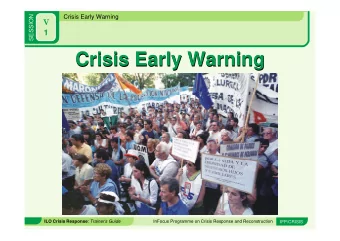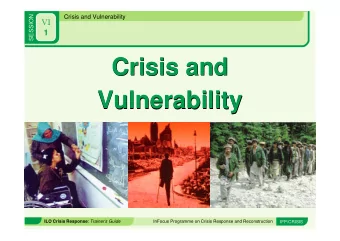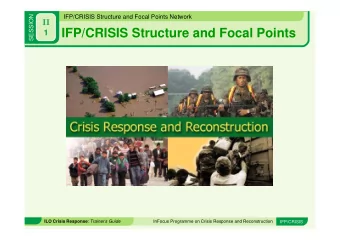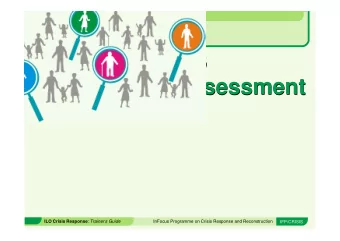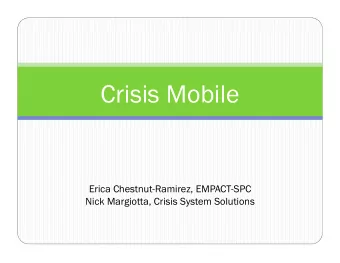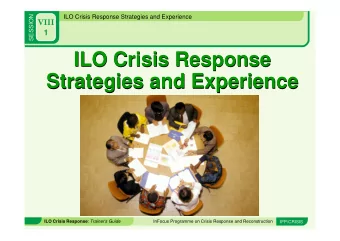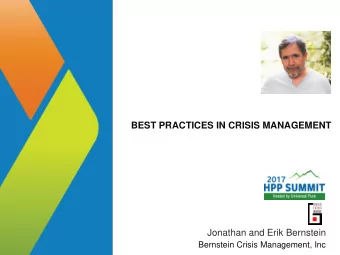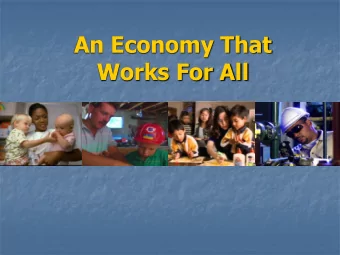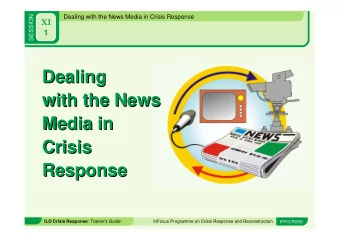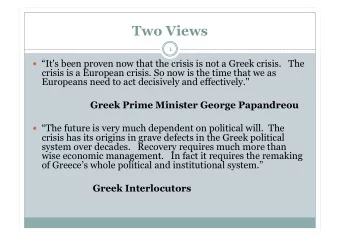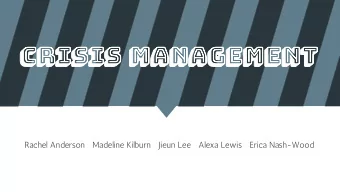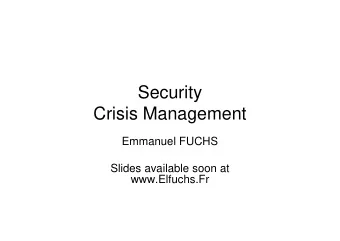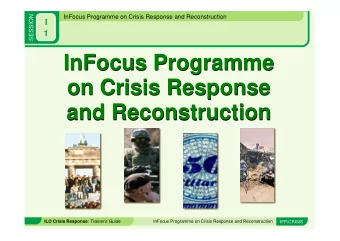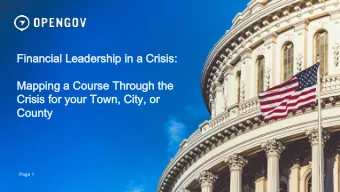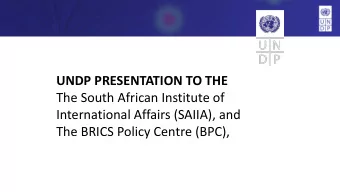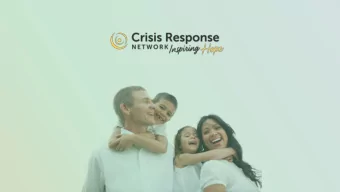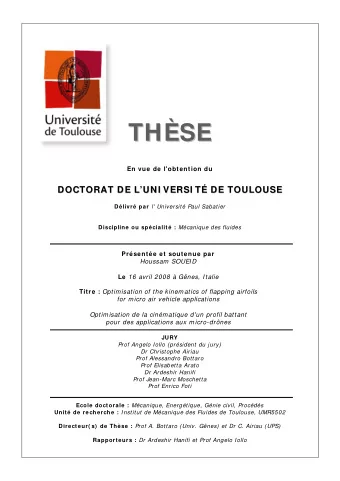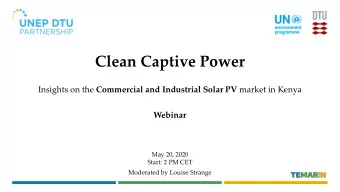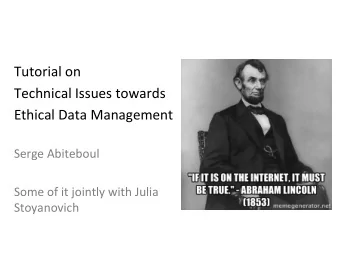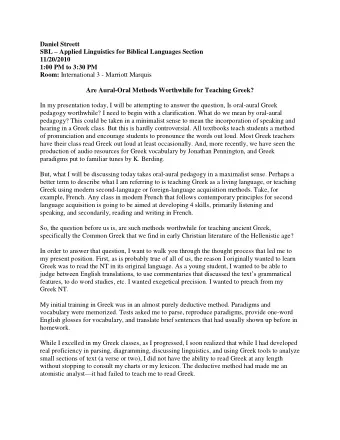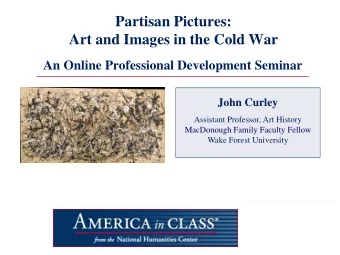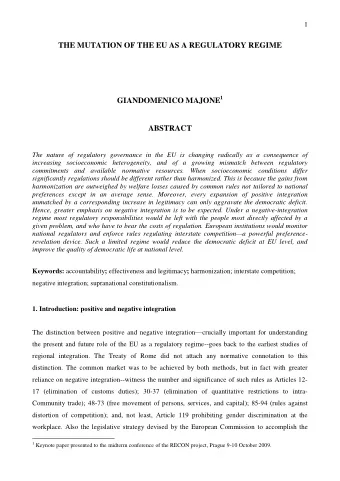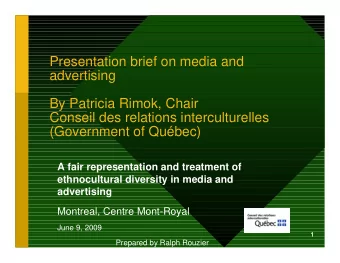
and the crisis of Western democracy Dr Daniel Briggs Not an expert - PowerPoint PPT Presentation
What doesnt work: Refugee integration, Europe and the crisis of Western democracy Dr Daniel Briggs Not an expert Daniel.briggs@universidadeuropea.es Context to the global refugee crisis General idea = hundreds of thousands of people
What doesn’t work: Refugee integration, Europe and the crisis of Western democracy Dr Daniel Briggs Not an expert Daniel.briggs@universidadeuropea.es
Context to the global refugee crisis General idea = hundreds of thousands of people are coming and there is little analysis why = “ Humanitarian crisis”? This is an active and ongoing project of global capitalism and “ economic neo-colonialism ” Europe is deeply responsible for conflict in refugee regions – military intervention has left deep division in most of these countries Global geo-political conflict is what is behind Syrian = This is a geo-political game so context requires global, economic, ideological, and political consideration
UNHCR (2016)
Global refugee crisis At the end of 2015 = 65.3 million forcibly displaced people; More than half of refugees come from just three countries: Syria, Afghanistan and Somalia; Turkey hosts by far the largest number with more than 3 million refugees and asylum-seekers, including 2.7 million Syrians; Growing numbers of children are crossing borders alone = 2015 more than 100,000 unaccompanied minors applied for asylum in 78 countries - triple the number in 2014 Source: UNICEF 2016
Europe: The crisis in numbers AIDA (2016) Source: AIDA 2016
My research: A new approach Self-funded ethnographic research in six European countries Observations of refugee camps; border crossings; NGOS; associations and helping services, housing projects and city centre spaces.
Finding gaps in the economy: Ziad and family in Istanbul Between 2011 and 2014 lived in Homs - moved six times in that time. Then October 2014 moved to Damascus for six months. Sons were 2, 3 and 5 at the time and when moved to Damascus, while his wife was pregnant with twins. Damascus didn’t work out because “there was not danger of bombs where I was living but there was a high risk of arrest, kidnapping, rape and assault. Many of my friends have been arrested kidnapped, some of them killed or disappeared probably killed.” Now teaches English in a Syrian school = “I had to work as soon as I got here. So many Syrian teachers cannot work in Turkey and it’s the same with Engineers, they have no chance here so they end up in knitting or making clothes which is 800 Turkish lira or € 230 for them per month which just about covers some of the rent .”
Mohammed and family in Istanbul Been in Istanbul since April 2015, have two sons (25 and 26) working for one year in the city but Mohammed and wife joined six months later. Left Syria, especially the sons, because they didn’t want to join the army. Paid for children to leave first, one left via Damascus and got to Jordan then to Turkey – one son was in Jordan for one year, then came to Turkey – the other son followed after. Mohammed and wife can’t find work (too old), sons support whole family working cash-in- hand and daughter’s (18) potential education. Rent is 1100 Turkish lira ($400) not including bills; just about surviving: “We are lucky, we have a flat, we have some money to support us, but there are millions in the border camps, they are the unlucky ones. They have no money, no passport, can’t enter countries. They left immediately, they left with nothing. We left with our decision but some people were completely forced .”
What happens if it doesn’t work out in one country?
What they come to: The political conditions in Europe Economic, political and social fragility of Eurozone in post-2008 crisis = questioning the legitimacy of free-border movements as nation states exercise a paranoia about “ others ” coming in = paradox with origins of the “ terrorists ”. Rising popularity of far right in absence of credible “ democratic ” politics = disorientated by mainstream politics and vulnerable to far right and extremism = clue to urban problems with second and third generation migrants in cities. Politically generated media stories about the “ other ” and their intentions to rob host states of their resources = undeserving “ Other ” association with “ terrorist ” = confusion, paranoia and hate crime. Consequences = nation states to ratchet up their anti-terrorist rhetoric and bomb the shit out of the countries from which the refugees are fleeing.
Europe losing patience
Most of my participants spent time in prison: Hamid’s photo from Hungary
Most have also suffered deep traumas At first, they hung him for days from the hands. When he still protested innocence, they started to break certain bones in his body, starting randomly with some fingers. Without knowing what he was supposed to be confessing to, the torturers went a step further and stripped him naked and burned the skin of his back through to the spinal bones. Where they saw a bone, they applied a red-hot prod. As he tells me, his voice quivers as he says “I’m sorry but I have many physical and psychological problems, I am very damaged.” [Abdul] Trust is brittle, caution is high.
But political pressures, social feeling and media stories constantly influence these peoples decisions Notwithstanding immigration centres are very often tense places where many rumours are shared about decision processes
From Syria to Libya to Algeria to Morocco to Spain to France to Belgium to Germany: Rami in Oelde
From Syria to Libya to Algeria to Morrocco to Spain to France to Germany …to Syria and to his grave: Najid, the man in the white hat.
Refugee overload: Brussels, Belgium
The next day …
The cul-de-sac: Calais refugee camp in France
Revolving populations of stateless citizens: Dunkirk, France
Forcing refugees into risk: Hossein and Iman in Zeebrugge, Belgium They say they spent only one day in Dunkirk because they said that the Kurdish mafia groups who control the camp area told them "if you don’t pay, you don’t stay". “Calais Jungle not good" mumbles Hossein in his best effort to speak English before producing out of his pockets a piece of paper which we tip into the light. It is an order to leave Belgium. Iman then produces his: they have until the 26th Feb to leave the “territory” as it states so in five days they should not be here. They are fearful of deportation but as there is no agreement between Belgium and Iran to deport the threat to ask the to leave the country carries little meaning. [Field notes]
Why Germany? Fear of presenting asylum = condemned to country / often have friends/family in more economically stable countries; Closure and/or increased policing of borders, minimal economic opportunity, political scapegoating has forced some to flee countries where they had initially presented asylum; Perceived as economic powerhouse of Europe; Use of aggressive/alienating social policies and police treatment in some countries defers asylum attempts to those places considered more “ civilised ”; The more Germany has established an efficient refugee system, the more it has attracted others; Labour deficit = government’s efforts to lure highly -skilled foreigners have largely fallen short = but most refugees have basic or no skills yet there is a demand for young people.
Potential barriers to integration in Germany Labour market = Estimated half of refugees will likely enter into compete with unskilled industry in which 20% are unemployed = swell ranks of unemployed Cultural integration = time of increased populism = could be damaging and have a knock-on effect on integration attempts Spatial distribution of refugee communities = reality is that refugees disproportionately settle in large cities, where they have better job prospects and existing social connections = isolating them from opportunity could cause resentment Management of urban relations in a time of increased populism = increases in “hate crime”, tensions of labour market competition, friction exacerbated by populism = loss of legitimacy in political institutions and change in government which could reverse the goodwill the country has shown towards refugees
Lessons from other countries Deal or no deal: Norway Reception centres = integration centres (integreringsmottak) For those only “likely” to get asylum seeker status; Required to sign a contract where they agree to demanding program of schooling, work training, volunteer work, cultural and societal information and other activities; If they don’t hold up their end of the deal move to another reception centre without this kind of system = where opportunities/activities fewer. High demand, only five centres = some government funded others on contract from the UDI (the norwegian directorate of immigration). After application accepted = integration and resettlement according to ability and two years of norwegian course, hopefully combined with work training at various places such as kindergardens, schools, restaurants, shops etc. Results vary as some have never been to school before while others hold masters and PhDs from home. Some prefer more work training than schooling and the other way around.
Recommend
More recommend
Explore More Topics
Stay informed with curated content and fresh updates.
